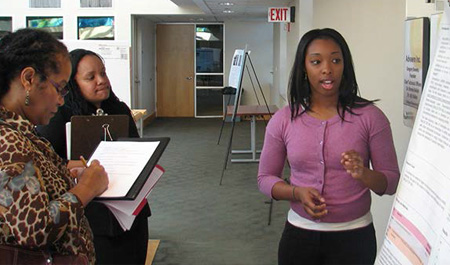N.C. A&T Undergraduate Research Program Earns Recognition

N.C. A&T's success in undergraduate research is drawing attention, particularly in Washington.
Two of the nation’s preeminent national scientific institutions – the National Academy of Sciences and the National Research Council – have named Dr. Mary Smith, chair of A&T's biology department, to the organizing committee for their upcoming conference, "Integrating Discovery-Based Research into the Undergraduate Curriculum." It will be held in Washington in May.
Undergraduate research is increasingly recognized as powerful tool for both education and retention of students.
Smith's appointment recognizes the long-term success of the department’s undergraduate research program. It comes on the heels of Dr. Greg Goins of the biology department being named a White House Champion of Change last month. He was recognized for effectively promoting college completion and student success on the basis of his leadership in undergraduate research.
Smith says her department’s now 20-year commitment to undergraduate research and other forms of active learning has led to increased numbers of biology majors and graduate students. Students are different today than they were in past generations, and their success, as well as the university’s, depends on more innovative and engaging approaches to teaching.
"You can’t teach them as you taught them in the past, even if they’re really good students," she says. "Trust me, they’re not going to sit there with 100 of them in the lecture room and just listen to someone talking."
The upcoming conference in Washington is the latest in a series of national initiatives supporting undergraduate research.
"The national movement is for this kind of change," Smith says. "They’re talking about student-centered learning, they're talking about undergraduate research. They’re talking about communication skills, they’re talking about critical thinking."
With the massive amount of data being generated about biological systems and so much of it accessible on the internet, critical thinking is an especially critical skill. "We have to be able to teach students to become independent learners. They have to be able to figure out what’s good information and what's not."
"We will be left behind if we fail to do this."
The national recognition that Smith and Goins have received is valuable as independent endorsements of the department’s success, but the most important endorsement comes from students. Biology’s increasing enrollment is one good measure of student support, and their success in going into the scientific work force and graduate school provides support for the department’s effectiveness.
Those indicators also illustrate one of benefits of the university’s push to become a more research-intensive university: Students benefit from being an essential part of the research program. From a teaching perspective, A&T's emphasis on research requires not only teachers committed to research, but also researchers who are committed to undergraduate education.
"I don’t want to hire a faculty member who isn’t interested in our students," Smith says.
N.C. A&T is a partner of The North Carolina Translational and Clinical Sciences (NC TraCS) Institute. Learn more at ncat.edu.
- Created on .